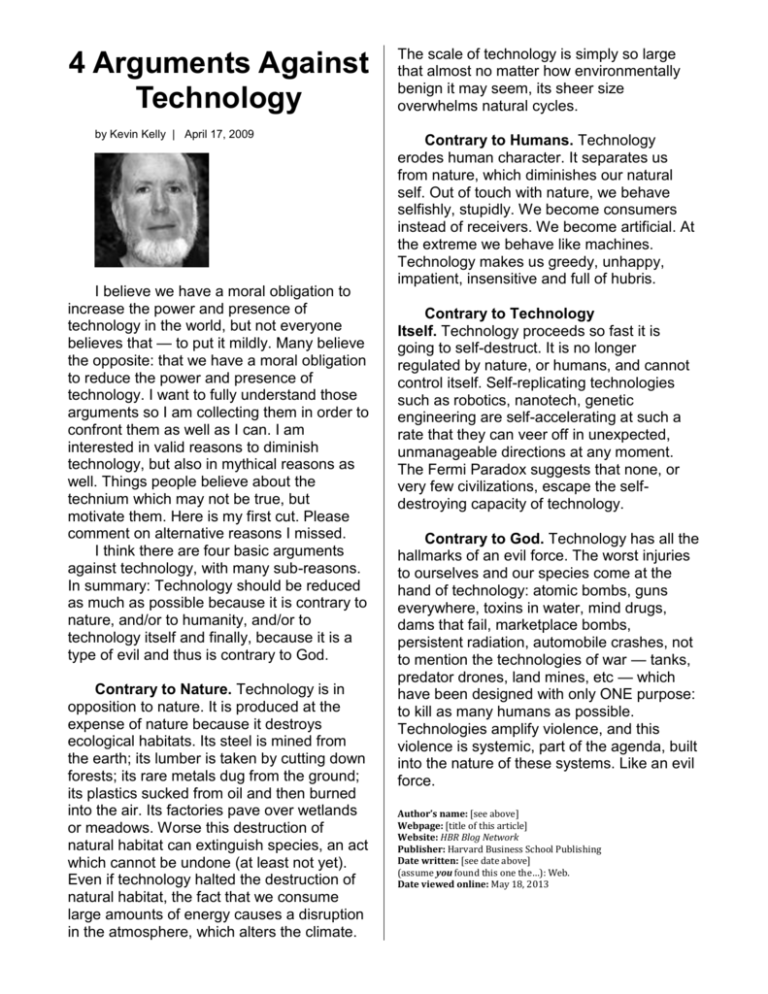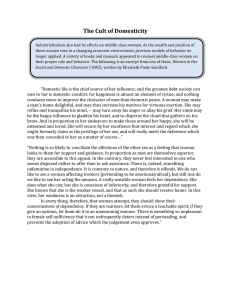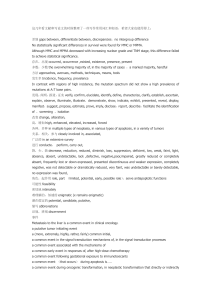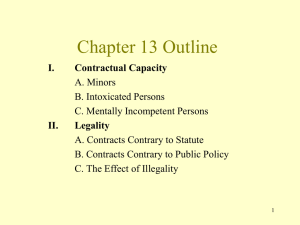General_ Arguments Against Technology
advertisement

4 Arguments Against Technology by Kevin Kelly | April 17, 2009 I believe we have a moral obligation to increase the power and presence of technology in the world, but not everyone believes that — to put it mildly. Many believe the opposite: that we have a moral obligation to reduce the power and presence of technology. I want to fully understand those arguments so I am collecting them in order to confront them as well as I can. I am interested in valid reasons to diminish technology, but also in mythical reasons as well. Things people believe about the technium which may not be true, but motivate them. Here is my first cut. Please comment on alternative reasons I missed. I think there are four basic arguments against technology, with many sub-reasons. In summary: Technology should be reduced as much as possible because it is contrary to nature, and/or to humanity, and/or to technology itself and finally, because it is a type of evil and thus is contrary to God. Contrary to Nature. Technology is in opposition to nature. It is produced at the expense of nature because it destroys ecological habitats. Its steel is mined from the earth; its lumber is taken by cutting down forests; its rare metals dug from the ground; its plastics sucked from oil and then burned into the air. Its factories pave over wetlands or meadows. Worse this destruction of natural habitat can extinguish species, an act which cannot be undone (at least not yet). Even if technology halted the destruction of natural habitat, the fact that we consume large amounts of energy causes a disruption in the atmosphere, which alters the climate. The scale of technology is simply so large that almost no matter how environmentally benign it may seem, its sheer size overwhelms natural cycles. Contrary to Humans. Technology erodes human character. It separates us from nature, which diminishes our natural self. Out of touch with nature, we behave selfishly, stupidly. We become consumers instead of receivers. We become artificial. At the extreme we behave like machines. Technology makes us greedy, unhappy, impatient, insensitive and full of hubris. Contrary to Technology Itself. Technology proceeds so fast it is going to self-destruct. It is no longer regulated by nature, or humans, and cannot control itself. Self-replicating technologies such as robotics, nanotech, genetic engineering are self-accelerating at such a rate that they can veer off in unexpected, unmanageable directions at any moment. The Fermi Paradox suggests that none, or very few civilizations, escape the selfdestroying capacity of technology. Contrary to God. Technology has all the hallmarks of an evil force. The worst injuries to ourselves and our species come at the hand of technology: atomic bombs, guns everywhere, toxins in water, mind drugs, dams that fail, marketplace bombs, persistent radiation, automobile crashes, not to mention the technologies of war — tanks, predator drones, land mines, etc — which have been designed with only ONE purpose: to kill as many humans as possible. Technologies amplify violence, and this violence is systemic, part of the agenda, built into the nature of these systems. Like an evil force. Author’s name: [see above] Webpage: [title of this article] Website: HBR Blog Network Publisher: Harvard Business School Publishing Date written: [see date above] (assume you found this one the…): Web. Date viewed online: May 18, 2013











